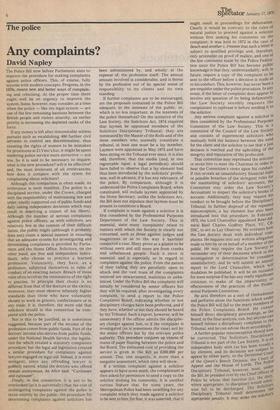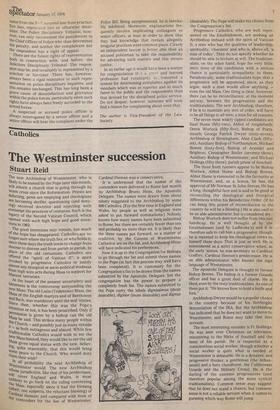Any complaints?
David Napley
The Police Bill now before Parliament aims to improve the procedure for making complaints against police officers. This, of course, fully accords with modern concepts. Progress, in the 1970s. means new and better ways of complaining and criticising. At the proper time there might well be an urgency to improve the system. Some, however, may consider, at a time when the police — like the legal system — are one of the few remaining bastions between the British people and violent anarchy, an earlier priority is increasing the depleted ranks of the force.
If any money is left after innumerable witless pursuits such as establishing 400 further civil servants to control sex discrimination, thus ensuring the rights of women to be mistaken for prostitutes at El Vino's bar, it might be spent rendering police service more attractive — not less. So it is said to be necessary to inquire: what is the new procedure? will it be effective? and, the most irrelevant of all irrelevancies, how does it compare with the sytem for complaining about solicitors?
Although this comparison is often made, its irrelevance is soon manifest. The police is a disciplined service, under the Crown, charged with the responsibility of maintaining law and order; wholly supported out of public funds and daily taking independent decisions which may result in depriving a citizen of his liberty. Although the number of serious complaints against police officers, as with solicitors, are relatively few in the context of their difficult duties, the public might (although it probably does not) claim a special interest in ensuring that an adequate system for investigating and determining complaints is provided by Parliament and the Home Office. Solicitors, on the other hand, are free and independent individuals, who choose to practice a learned profession. Voluntarily, they have, as a profession, subjected themselves to rules of conduct of an exacting nature. Breach of those rules often involves the termination of the right to practise. In principle their choice is no different from that of the doctors or the clerics; moreover, they must observe infinitely higher standards than those who have voluntarily chosen to work as grocers, confectioners or in any trade. It is, therefore, the more odd that solicitors should in this connection be compared with the police.
Nor is this to be justified, as is sometimes suggested, because part of the income of the profession comes from public funds. Part of the doctors' income also derives from public funds, under the National Health Service, the legislation for which created a statutory complaints . procedure; but the legal aid legislation created a similar procedure for complaints against lawyers engaged on legal aid. Indeed, it is more stringent, since any offending lawyer is publicly named, whilst the doctors who offend remain anonymous. As Alice said: "Curiouser and curiouser".
Finally, in this connection, it is not to be overlooked (as it is universally) that the cost of investigating complaints against the police is borne entirely by the public; the procedure for determining complaints against solicitors has been administered by, and wholly at the expense of, the profession itself. The annual amount involved is considerable, and is borne by the profession out of its special sense of responsibility to its clients and its own standing.
If further complaints are to be encouraged, are the proposals contained in the Police Bill adequate, in the interests of the public, or, which is no less important, in the interests of the police themselves? On the initiative of the Law Society, the Solicitors Act, 1974 required that laymen be appointed members of the Solicitors Disciplinary Tribunal; they are nominated by the Master of the Rolls and of the three members who normally constitute a tribunal, at least one must be a lay member. Laymen were appointed in May 1975 and have been sitting on the Tribunal ever since. It is also odd, therefore, that the media (and, in one regrettable lapse, a legal periodical) should have failed to observe that a lay element had thus been introduced by the solicitors' profession, well in advance, if it has any relevance, of the police. By comparison, although it is understood the Police Complaints Board, when constituted, will include laymen appointed by the Home Secretary, unlike the Solicitors Act, the Bill does not stipulate that laymen must be present to constitute a Board.
If complaint is made against a solicitor it is first considered by the Professional Purposes Department of the Law Society. This is essential, since many 'complaints' relate to matters with which the Society is clearly not concerned, such as those against judges and magistrates or as to the way a barrister conducted a case. Many prove at a glance to be without merit and still more are from cranks and unbalanced people. Such a sieve is essential, and is especially so in regard to complaints against the police. From the nature of their calling they are peculiarly open to attack and the vast mass of the complaints received are unwarranted, malicious or unbalanced. Under the Police Bill the complaint will initially be considered by senior officers but they will be required, after investigating every complaint, to send a report to the Police Complaints Board, indicating whether or not disciplinary charges have been preferred, and if they have, whether or not they should be heard by the Tribunal. Such a report, however, will be unnecessary if the officer admits the disciplinary charges against him, or if the complaint is investigated (as is sometimes the case) not by the senior officers but by the relevant police authority. This procedure conjures up visions of reams of paper floating between the police and the Board. The estimated cost of providing the service is given in the Bill as £300,000 per annum. This, one suspects, is more than a sanguine assessment, which time will show.
If a written complaint against a solicitor appears to have some merit, the complainant is then asked for permission to send a copy to the solicitor inviting his comments. It is another curious feature that, for some years, the Metropolitan Police had been unwilling for any complaint which they made against a solicitor to be sent to him, for fear, it was asserted, that it
Spectator January 17, 1976 might result in proceedings for defamation. Clearly it would be contrary to the rules of natural justice to proceed against a solicitor without first seeking his comments on the complaint; it was held in 1972 in the case of Beach and another v. Freeson that such a letter is subject to qualified privilege and, therefore, only actionable on proof of malice, and one of the few comments made by the Police Federation since the Police Bill has become public knowledge is that they, understandably, will, in future, require a copy of the complaint to be sent to the officer before a decision is made as to his conduct. This, however, has never been a pre-requisite under the police procedure. In any event, if the letter of complaint does appear to involve any question of its being defamatory, the Law Society sensibly requests the complainant to rephrase it before sending it to the solicitor.
Any serious complaint against a solicitor is then considered by the Professional Purposes Committee of the Law Society. This is a committee of the Council of the Law Society and consists of experienced solicitors who zealously hold the balance between the need for the client and the solicitor to see that a just decision is reached and the upholding of the integrity and reputation of the profession.
That committee may reprimand the solicitor or invite him to meet the Chairman in order to hear the Committee's views upon his conduct. If this reveals an unsatisfactory financial state or possible breaches of the stringent rules for the maintaining of solicitors' accounts, the Committee may order the Law Society's Accountant to inspect the solicitor's books of account. Additionally, they may require his conduct to be brought before the DisciplinarY Tribunal. In further disproof of the repeated. misconception, a lay element has also been introduced into this procedure. In FebruarY 1975, the Lord Chancellor appointed Rear-Mmiral Basil Charles Godfrey Place, VC, CE3' DSC, to act as Lay Observer. He oversees ho" the Law Society deals with individual cornplaints. He inquires into any written allegation made to him by or on behalf of a member of the public. He may require the Law Society 10 reconsider any of their decisions which in the investigation or determination he considers unsatisfactory, and he will submit an annua.! report to the Lord Chancellor, which mf°1 doubtless be published. It will be an occasion for some surprise if he has any really significant criticism to make of the impartiality or effectiveness of the practices of the Professional Purposes Committee. He acts therefore as a sort of Ombudusnrnaeo and performs alone the functions which under the Police Bill will fall to the many members of t the Police Complaints Board. He cannot himself direct disciplinary proceedings, as the Board, in the final analysis, can, but anyone can himself initiate a disciplinary complaint to the Tribunal, and he can advise them accordinglYvv. A further popular misconception should no • be corrected. The Solicitors Disciplin arY i Tribunal is not part of the Law Society. It s an independent body with (as has been noted),.! lay element, and its decisions are subjetuirrut appeal by either party, to the Divisional o
ad the House of Los. The ppeal n
Disciplinary Tribunal, however, must, under the Bill, be presided over by the Chief Officer of Police by whom that function (i.e. the duty,, where appropriate, to discipline) would other'
wise fall to be discharged. The S.olisc 5 the
Disciplinary Tribunal itself determines appropriate penalty. It may strike the soh nu
name from the suspend him from practice, fine him, reprimand him or otherwise determine. The Police Disciplinary Tribunal, however, can only recommend the punishment to the Chief Officer of Police who then determines the penalty, and neither the complainant nor the. respondent has a right of appeal.
1 here are the fullest rights of representation both in connection with, and before, the Solicitors Disciplinary Tribunal. The respondent may be, and invariably is, represented by a solicitor or barrister. There has, however, always been a rigid resistance to such representation on police disciplinary inquiries, and this remains unchanged. This has long been a grave cause of dissatisfaction and grievance Within the police forces, particularly since such nghts have always been freely accorded to the armed forces.
A suspected or accused police officer is always interrogated by a senior officer and a senior officer will hear the complaint under the Police Bill. Being unrepresented, he is inevitably inhibited. Moreover, explanations frequently involve implicating colleagues or senior officers, at least in order to show that they had knowledge that certain allegedly irregular practices were common place. Clearly an independent lawyer is better able than an accused policeman to take the responsibility for advancing such matters and this ensure justice. In an earlier age it would have been a matter for congratulation th ,t a greit and learned profession had voluntarily i,1,lemented a system for determining complaints against its members which was so superior and so much fairer to the public and the respondents than that devised for the disciplined police service. Do not despair, however, someone will soon find a reason for complaining about even that.
The author is Vice-President of the Law Society



























 Previous page
Previous page